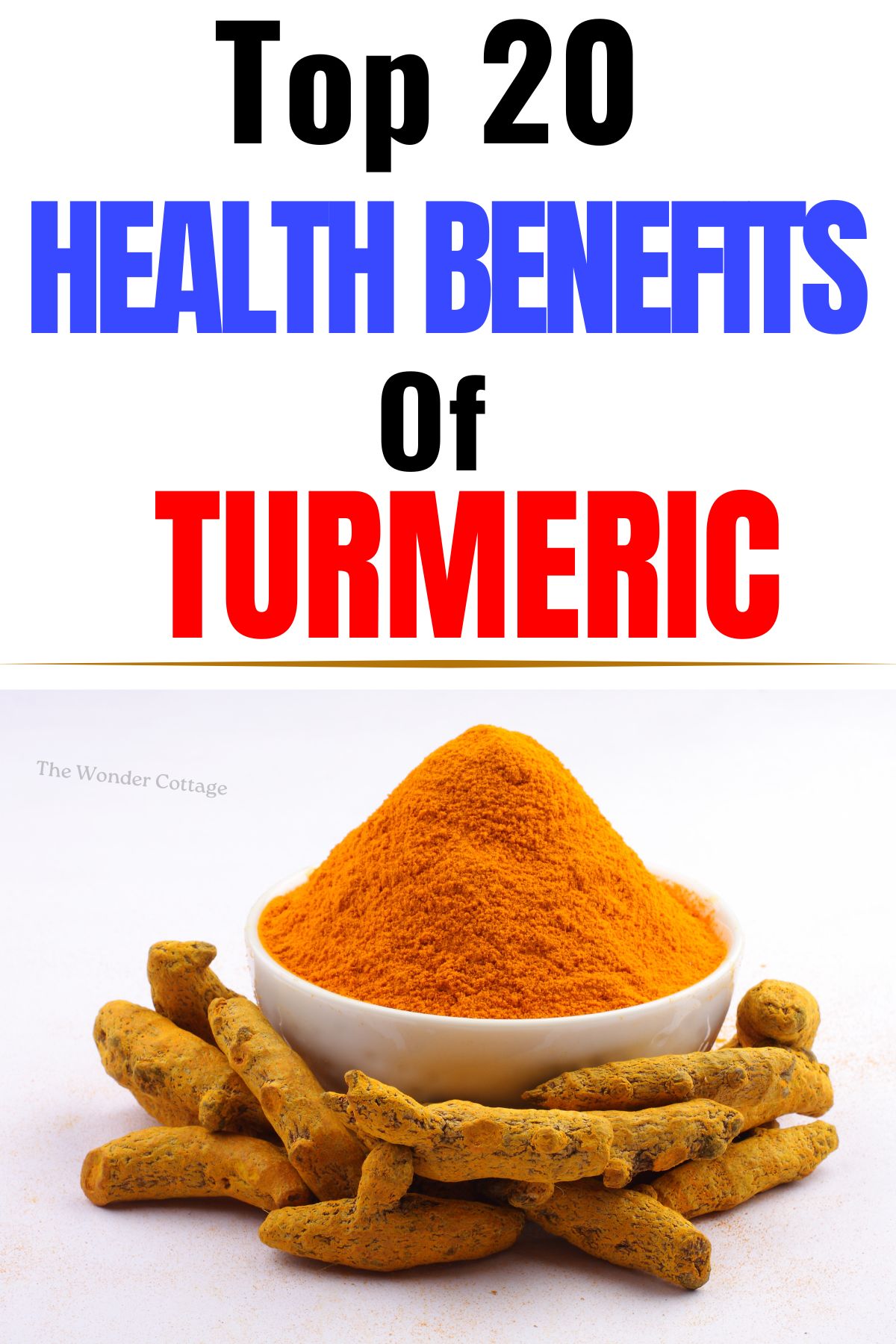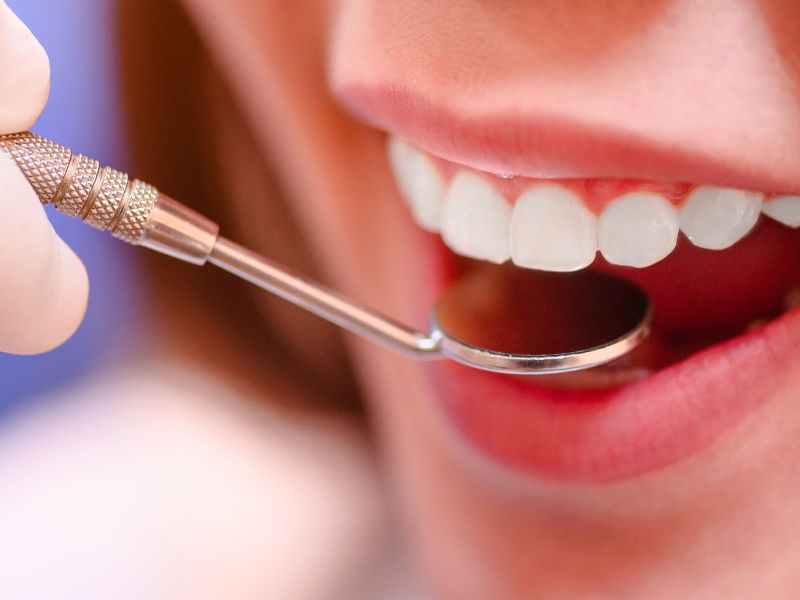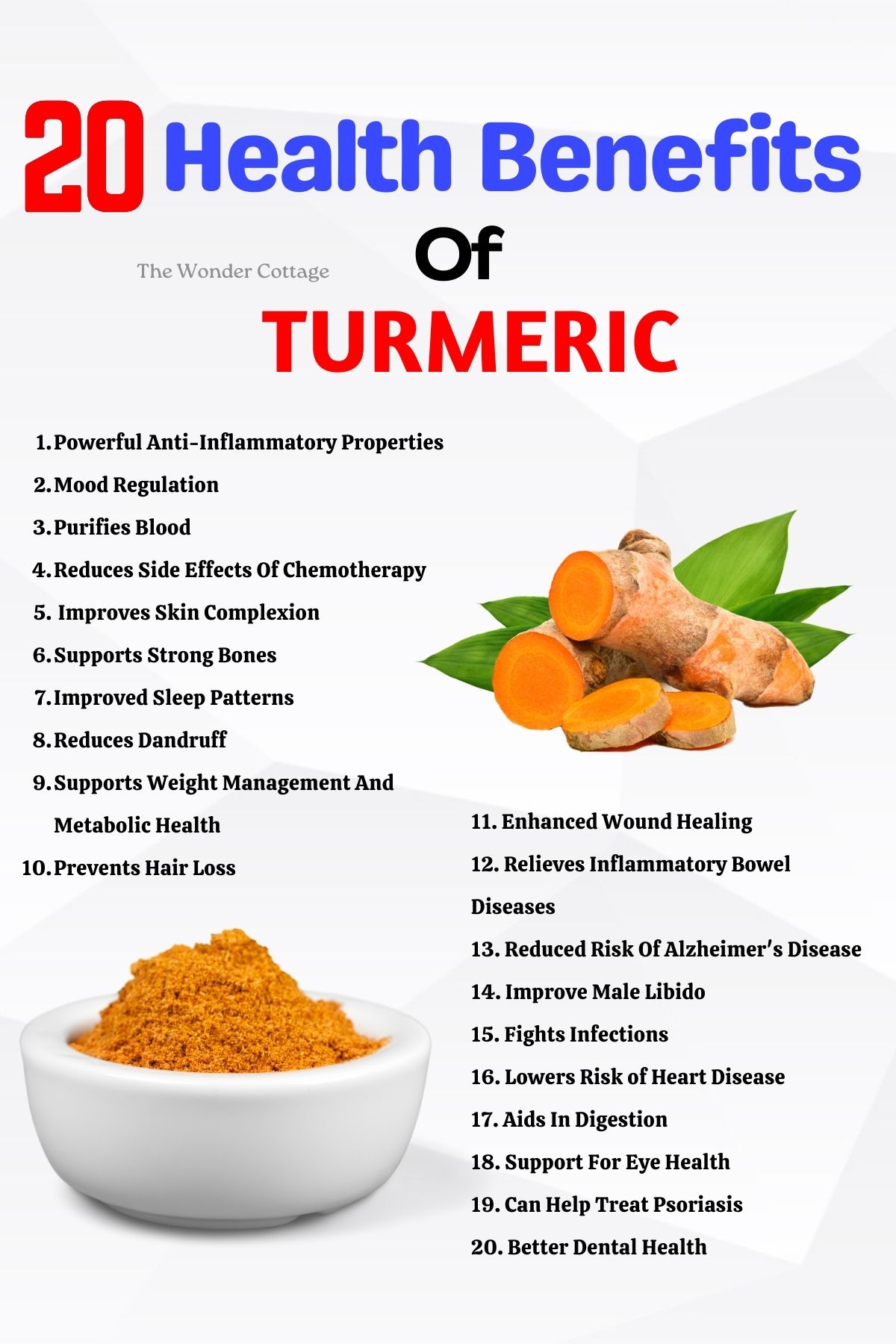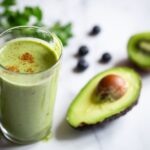There are numerous health advantages associated with turmeric, the golden spice known for its powerful active ingredient, curcumin. Celebrated for its multiple impacts on well-being, it has been used in traditional medicine and food preparation.
In the following exploration, we’ll uncover 20 significant ways in which turmeric can contribute to overall health and address a range of health issues. From soothing inflammation to supporting heart health and more, turmeric’s versatility makes it a valuable addition to promoting a healthier and happier life.

20 Health Benefits Of Turmeric
1. Powerful Anti-Inflammatory Properties
Turmeric’s key ingredient, curcumin, is more than simply a spice, it’s a health superhero. This powerful substance works wonders in the fight against inflammation in the body as an effective anti-inflammatory agent. Curcumin can help you with a variety of conditions, including inflammatory illnesses, arthritis, and general well-being.
By reducing inflammation, curcumin helps alleviate pain and discomfort, offering relief to those suffering from various ailments. Its natural properties make it a popular choice for individuals seeking alternative remedies for managing chronic conditions.
2. Mood Regulation
Curcumin, the active ingredient in turmeric, isn’t just about physical health; it’s a mood-boosting marvel too. Research suggests that curcumin may play a role in regulating mood, alleviating symptoms of depression, and enhancing overall mental well-being.
Its calming effects contribute to stress reduction, promote relaxation, and foster emotional balance. By incorporating curcumin into your daily routine, you may discover a natural way to uplift your spirits and find greater peace of mind.
So, why not sprinkle a little extra happiness into your life with the help of curcumin and embrace a brighter, more balanced you?
3. Purifies Blood
One of the health benefits often attributed to turmeric is its ability to help purify the blood. Turmeric contains a compound called curcumin, which is believed to have properties that can assist in cleansing the blood.
Curcumin is thought to support the liver, which is responsible for filtering toxins and impurities from the blood. By aiding the liver in its detoxification processes, turmeric may help remove harmful substances from the bloodstream, promoting better overall health.
While scientific research is ongoing to fully understand the extent of turmeric’s impact on blood purification, many cultures have traditionally used turmeric for its perceived cleansing effects. Adding turmeric to your diet may be a simple way to support your body’s natural detoxification processes and promote a healthier circulation system.
4. Reduces Side Effects Of Chemotherapy
Curcumin, the main ingredient in turmeric, is thought to have health advantages, including having the ability to lessen chemotherapy side effects. Chemotherapy can have a number of negative effects in addition to nausea, vomiting, tiredness, and inflammation, even if it is an effective treatment for cancer.
Studies suggest that curcumin may help alleviate some of these side effects. It’s known for its anti-inflammatory and antioxidant properties, which could help reduce inflammation and oxidative stress caused by chemotherapy.
Moreover, curcumin may also aid in protecting healthy cells from the harmful effects of chemotherapy drugs while enhancing the effectiveness of the treatment against cancer cells.
While turmeric and curcumin show promise in reducing chemotherapy side effects, it’s essential to consult healthcare professionals before using them as complementary treatments. They can provide guidance on safe and effective ways to incorporate turmeric into cancer treatment plans.

5. Improves Skin Complexion
Turmeric offers a natural way to enhance skin complexion. Its active compound, curcumin, has anti-inflammatory and antioxidant properties that can help brighten and even out skin tone. Curcumin may reduce the appearance of dark spots, acne scars, and blemishes while promoting a healthy glow.
Turmeric’s antimicrobial properties also make it effective against acne-causing bacteria, helping to prevent breakouts. Additionally, it supports collagen production, which improves skin elasticity and reduces signs of aging like wrinkles and fine lines. Incorporating turmeric into skincare routines through masks, creams, or dietary intake can lead to smoother, clearer, and more radiant skin.
Related Posts
6. Supports Strong Bones
Turmeric offers support for strong bones through its potential to improve bone density and strength. Its active component, curcumin, helps reduce inflammation, which can contribute to bone disorders like osteoporosis. Curcumin may also stimulate bone-forming cells, aiding in the maintenance of healthy bone mass.
By inhibiting the activity of osteoclasts, cells that break down bone tissue, turmeric may help prevent bone loss. Including turmeric in your diet or as a supplement could complement bone health efforts, alongside a balanced diet and regular exercise. However, consulting a healthcare provider is advisable before using turmeric for bone health purposes.

7. Improved Sleep Patterns
Turmeric may contribute to improved sleep patterns, thanks to its calming and anti-inflammatory properties. Its active compound, curcumin, helps regulate neurotransmitters like serotonin and dopamine, which play crucial roles in sleep regulation and mood.
By reducing inflammation in the body and promoting relaxation, turmeric can create a conducive environment for better sleep. It may also alleviate conditions like insomnia or restless sleep by soothing the nervous system.
While more research is needed to fully understand turmeric’s impact on sleep, incorporating it into your diet or bedtime routine could potentially promote more restful and rejuvenating sleep. Always consult with a healthcare professional for personalized advice.
8. Reduces Dandruff
Turmeric is believed to reduce dandruff, offering a natural solution to this common scalp issue. Its active ingredient, curcumin, possesses anti-inflammatory and antimicrobial properties that can help address dandruff-related concerns. Curcumin may calm inflammation on the scalp, soothing irritation and itchiness often associated with dandruff.
Additionally, its antimicrobial effects can help combat the fungus that contributes to dandruff formation. Using turmeric-infused hair masks or shampoos may help alleviate dandruff symptoms and promote a healthier scalp environment. While turmeric shows promise in managing dandruff, consulting a dermatologist for persistent dandruff issues is advisable for personalized treatment recommendations.

9. Supports Weight Management And Metabolic Health
Turmeric supports weight management and metabolic health with its active compound, curcumin. Curcumin aids weight loss by boosting metabolism, helping the body burn calories more efficiently. It also regulates blood sugar levels, reducing the risk of insulin resistance and diabetes.
Additionally, curcumin may suppress fat tissue growth and reduce inflammation associated with obesity. By enhancing metabolic function, turmeric promotes overall wellness and assists in maintaining a healthy weight. Incorporating turmeric into meals or taking supplements may complement a balanced diet and active lifestyle.
10. Prevents Hair Loss
Turmeric prevents hair loss with its active compound, curcumin. Curcumin stimulates hair follicles, promoting hair growth and preventing hair loss. Its anti-inflammatory and antioxidant properties also nourish the scalp, reducing scalp conditions that contribute to hair loss.
Using turmeric-infused products or applying turmeric directly to the scalp may help maintain healthy hair.
11. Enhanced Wound Healing
Turmeric enhances wound healing due to its anti-inflammatory and antimicrobial properties. Curcumin, its active compound, reduces inflammation and fights infection, aiding in the healing process.
Applying turmeric paste or ointment to wounds may accelerate healing and prevent complications, fostering better overall health and well-being.
12. Relieves Inflammatory Bowel Diseases
Turmeric provides relief for inflammatory bowel diseases (IBD) like Crohn’s disease and ulcerative colitis. Its active compound, curcumin, reduces inflammation in the digestive tract, alleviating symptoms such as abdominal pain and diarrhea.
Curcumin’s antioxidant properties also help protect the gut lining. Including turmeric in the diet may help manage IBD symptoms and improve overall gastrointestinal health.
13. Reduced Risk Of Alzheimer’s Disease
Turmeric may reduce the risk of Alzheimer’s disease, a progressive neurological disorder. Curcumin, its active compound, has anti-inflammatory and antioxidant properties that may protect brain cells from damage and reduce the buildup of harmful plaques associated with Alzheimer’s.
Including turmeric in the diet or as a supplement may help support brain health and potentially lower the risk of developing Alzheimer’s disease.
14. Improve Male Libido
Turmeric may help improve male libido, enhancing sexual health. Its active compound, curcumin, promotes better blood circulation, which can contribute to stronger erections. Additionally, curcumin’s antioxidant properties support overall cardiovascular health, a key factor in sexual function.
While more research is needed, incorporating turmeric into the diet or supplementing with it may help support male sexual vitality and performance.
15. Fights Infections
Curcumin, the primary ingredient in turmeric, fights infections. The strong antibacterial qualities of curcumin help fight off dangerous bacteria, viruses, and fungi. Turmeric aids in the prevention of infections by preventing their growth.
Its anti-inflammatory properties also help reduce infection-related inflammation, which promotes healing and enhances general well-being.
16. Lowers Risk of Heart Disease
Turmeric lowers the risk of heart disease, supporting cardiovascular health. Its active compound, curcumin, improves blood vessel function, reduces inflammation, and lowers cholesterol levels. Curcumin’s antioxidant properties also protect against oxidative damage to the heart.
Incorporating turmeric into the diet or taking supplements may help maintain healthy blood pressure and reduce the risk of heart disease, promoting overall heart health and well-being.
17. Aids In Digestion
Turmeric aids in digestion, supporting a healthy digestive system. Its active compound, curcumin, stimulates the gallbladder to produce bile, which helps break down fats and aids in digestion. Curcumin also reduces inflammation in the digestive tract, reducing symptoms of indigestion and bloating.
Including turmeric in meals or consuming it as a supplement may help improve digestion and promote gastrointestinal health.
18. Support For Eye Health
Turmeric offers support for eye health, thanks to its antioxidant properties. Its active compound, curcumin, helps protect the eyes from oxidative stress and age-related damage. Curcumin may also reduce the risk of conditions like cataracts and macular degeneration, which can lead to vision loss.
Including turmeric in the diet or as a supplement may help maintain healthy eyesight and promote overall eye health, especially with advancing age.
19. Can Help Treat Psoriasis
Turmeric can help treat psoriasis, a chronic skin condition characterized by red, itchy patches. Its active compound, curcumin, has anti-inflammatory properties that reduce inflammation and relieve symptoms of psoriasis.
Curcumin also inhibits the excessive growth of skin cells, a hallmark of psoriasis. Applying turmeric topically or consuming it may help alleviate symptoms and improve the appearance of psoriatic lesions, providing relief to those with this skin condition.

20. Better Dental Health
Turmeric’s antibacterial and anti-inflammatory qualities help to improve oral health. Curcumin, its active ingredient, fights harmful bacteria in the mouth to lower the risk of gum disease, cavities, and bad breath. Curcumin also helps reduce inflammation of the gums, known as gingivitis, promoting healthier gums and overall oral hygiene.
Additionally, turmeric’s natural whitening properties can help remove surface stains on teeth, enhancing their appearance. Incorporating turmeric into oral care routines, such as using turmeric-infused toothpaste or mouthwash, may contribute to maintaining a bright smile and healthy teeth and gums for improved dental well-being.
Conclusion
Turmeric is regarded as a “golden treasure of health,” providing a host of benefits for general well-being. Its main ingredient, curcumin, has strong antibacterial, anti-inflammatory, and antioxidant qualities that support its wide spectrum of health-promoting benefits.
Turmeric’s natural therapeutic properties have been appreciated for generations, with benefits ranging from lowering inflammation and boosting heart health to improving digestion and encouraging cleaner skin.
Whether added topically, taken as a supplement, or used in everyday cooking, turmeric provides a safe and efficient means of promoting the body’s own healing processes and preserving health. Turmeric is still an important part of current healthcare methods and an essential component in traditional medicine practices as research into its entire range of health benefits proceeds, providing promise for a healthier and more promising future.







